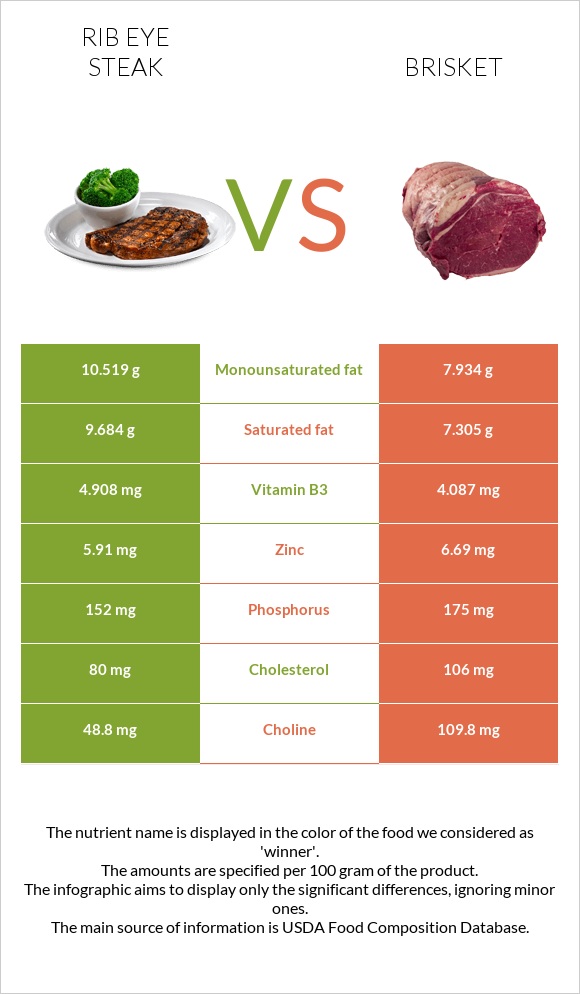Rib eye steak vs. Brisket — In-Depth Nutrition Comparison
Compare
Summary of differences between rib eye steak and brisket
- Rib eye steak has more vitamin B6, vitamin B2, vitamin B3, and monounsaturated fat; however, brisket is higher in choline and zinc.
- Rib eye steak covers your daily need for vitamin B6, 15% more than brisket.
- Rib eye steak has 2 times more vitamin B2 than brisket. While rib eye steak has 0.287mg of vitamin B2, brisket has only 0.171mg.
- Brisket has less saturated fat.
These are the specific foods used in this comparison Beef, rib eye steak, boneless, lip-on, separable lean, and fat, trimmed to 1/8" fat, all grades, cooked, grilled and Beef, brisket, flat half, separable lean, and fat, trimmed to 1/8" fat, all grades, cooked, braised.
Infographic

Infographic link
Mineral Comparison
Mineral comparison score is based on the number of minerals by which one or the other food is richer. The "coverage" charts below show how much of the daily needs can be covered by 300 grams of the food.
| Contains more MagnesiumMagnesium | +15.8% |
| Contains more PotassiumPotassium | +12.1% |
| Contains more ManganeseManganese | +700% |
| Contains more CalciumCalcium | +45.5% |
| Contains more CopperCopper | +25% |
| Contains more ZincZinc | +13.2% |
| Contains more PhosphorusPhosphorus | +15.1% |
| Contains less SodiumSodium | -11.1% |
Vitamin Comparison
Vitamin comparison score is based on the number of vitamins by which one or the other food is richer. The "coverage" charts below show how much of the daily needs can be covered by 300 grams of the food.
| Contains more Vitamin AVitamin A | +∞% |
| Contains more Vitamin DVitamin D | +∞% |
| Contains more Vitamin B1Vitamin B1 | +20.3% |
| Contains more Vitamin B2Vitamin B2 | +67.8% |
| Contains more Vitamin B3Vitamin B3 | +20.1% |
| Contains more Vitamin B6Vitamin B6 | +69.1% |
| Contains more Vitamin EVitamin E | +410% |
| Contains more Vitamin KVitamin K | +12.5% |
| Contains more FolateFolate | +50% |
All nutrients comparison - raw data values
| Nutrient |  |
 |
DV% diff. |
| Vitamin B6 | 0.477mg | 0.282mg | 15% |
| Choline | 48.8mg | 109.8mg | 11% |
| Saturated fat | 9.684g | 7.305g | 11% |
| Protein | 23.69g | 28.82g | 10% |
| Cholesterol | 80mg | 106mg | 9% |
| Vitamin B2 | 0.287mg | 0.171mg | 9% |
| Zinc | 5.91mg | 6.69mg | 7% |
| Monounsaturated fat | 10.519g | 7.934g | 6% |
| Fats | 21.81g | 18.42g | 5% |
| Selenium | 29.7µg | 27.1µg | 5% |
| Vitamin B3 | 4.908mg | 4.087mg | 5% |
| Phosphorus | 152mg | 175mg | 3% |
| Vitamin E | 0.1mg | 0.51mg | 3% |
| Manganese | 0.08mg | 0.01mg | 3% |
| Iron | 2.24mg | 2.43mg | 2% |
| Copper | 0.08mg | 0.1mg | 2% |
| Polyunsaturated fat | 1.027g | 0.681g | 2% |
| Vitamin D | 7 IU | 1% | |
| Magnesium | 22mg | 19mg | 1% |
| Calcium | 11mg | 16mg | 1% |
| Potassium | 260mg | 232mg | 1% |
| Vitamin A | 8µg | 0µg | 1% |
| Vitamin D | 0.2µg | 1% | |
| Vitamin B1 | 0.071mg | 0.059mg | 1% |
| Vitamin B5 | 0.536mg | 0.568mg | 1% |
| Vitamin B12 | 2.1µg | 2.12µg | 1% |
| Folate | 6µg | 9µg | 1% |
| Calories | 291kcal | 289kcal | 0% |
| Sodium | 54mg | 48mg | 0% |
| Vitamin K | 1.6µg | 1.8µg | 0% |
| Trans fat | 1.478g | N/A | |
| Tryptophan | 0.265mg | 0.181mg | 0% |
| Threonine | 1.116mg | 1.101mg | 0% |
| Isoleucine | 1.103mg | 1.253mg | 0% |
| Leucine | 2.041mg | 2.192mg | 0% |
| Lysine | 2.269mg | 2.328mg | 0% |
| Methionine | 0.641mg | 0.717mg | 0% |
| Phenylalanine | 0.95mg | 1.088mg | 0% |
| Valine | 1.184mg | 1.367mg | 0% |
| Histidine | 0.888mg | 0.879mg | 0% |
| Omega-3 - EPA | 0.001g | 0g | N/A |
| Omega-3 - DHA | 0.001g | 0g | N/A |
| Omega-3 - ALA | 0.038g | N/A | |
| Omega-3 - DPA | 0.014g | 0g | N/A |
| Omega-6 - Dihomo-gamma-linoleic acid | 0.024g | N/A | |
| Omega-6 - Eicosadienoic acid | 0.005g | N/A | |
| Omega-6 - Linoleic acid | 0.7g | N/A |
Macronutrient Comparison
Macronutrient breakdown side-by-side comparison
Protein:
23.69 g
Fats:
21.81 g
Carbs:
0 g
Water:
54.49 g
Other:
0.01 g
Protein:
28.82 g
Fats:
18.42 g
Carbs:
0 g
Water:
52.48 g
Other:
0.28 g
| Contains more FatsFats | +18.4% |
| Contains more ProteinProtein | +21.7% |
| Contains more OtherOther | +2700% |
~equal in
Carbs
~0g
~equal in
Water
~52.48g
Fat Type Comparison
Fat type breakdown side-by-side comparison
Saturated fat:
Sat. Fat
9.684 g
Monounsaturated fat:
Mono. Fat
10.519 g
Polyunsaturated fat:
Poly. Fat
1.027 g
Saturated fat:
Sat. Fat
7.305 g
Monounsaturated fat:
Mono. Fat
7.934 g
Polyunsaturated fat:
Poly. Fat
0.681 g
| Contains more Mono. FatMonounsaturated fat | +32.6% |
| Contains more Poly. FatPolyunsaturated fat | +50.8% |
| Contains less Sat. FatSaturated fat | -24.6% |





